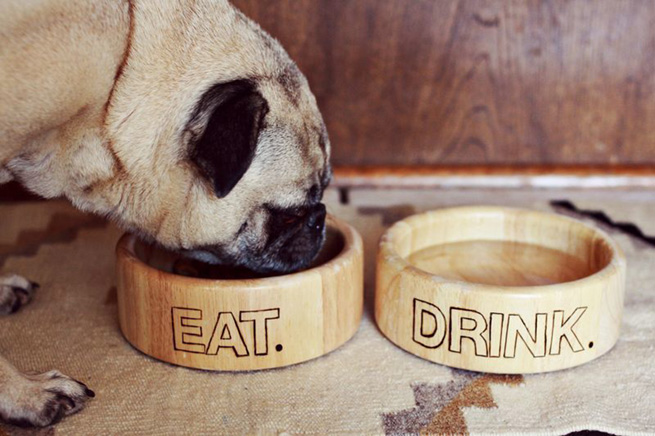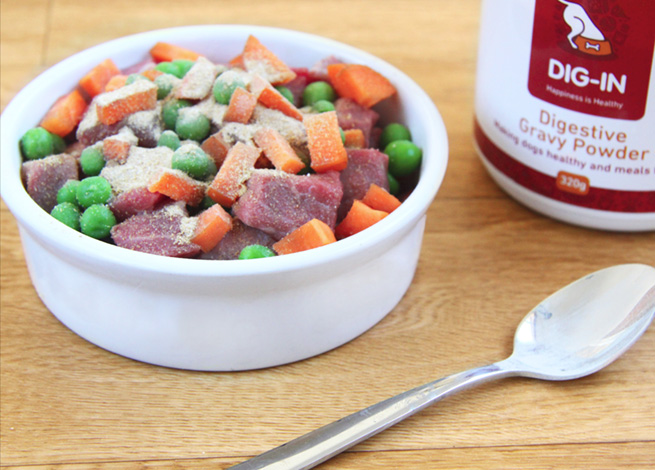Pet health: support your dog’s digestive system
Good digestion is essential for your dog’s wellbeing so it pays to make sure that your dog’s diet packs a nutritional punch.
21 Mar 2016 By Leanne Philpott Comments

Frank Van Doore and Dr David Tivey are passionate food scientists and the founders of Dig-In Digestive Gravy Powder – an all natural, human-grade health food supplement for your canine chum.
Dig-In helps to fight against common food allergies and improve dogs’ digestive health, which can save pet owners a packet on vet bills. Zookie caught up with Frank and Tim for a chin-wag about doggy digestion and how dog lovers can support and improve the health of their furry friends.


Frank explains that the increase in the number of dogs presenting at veterinary surgeries with food allergies comes down to the sheer number of pets in Australia.
“There are estimated to be 4.2 million pet dogs in Australia; 19 dogs for every 100 people. Cats come next with 29% of households owning a cat, an estimated 3.3 million pet cats in Australia and 15 cats for every 100 people.”
“During my teen years, my best and frequently only friend was our Pekinese named Fluffy. He was a beautiful natured dog but he always had severe skin allergies. His illness was so severe that he had scratched off all the hair on his hind quarters. The vets were perplexed and there seem to be no real cure. I remember his suffering and the helplessness that we felt to help him. That memory is still with me to this day – many, many years later,” Frank tells us.
“I am a food scientist who has been involved in human and pet food research and development for over 20 years. I met Dr Tivey more than five years ago and we struck up a conversation about his work in allergy reduction in animal foods. After this discussion I realised that his research coupled with my experience in prebiotic/probiotic and healthy pet foods could help to develop a new product that could alleviate pet suffering. Dig-in was the recipe that we came up with. It not only helps overcome common food allergies but it also helps builds a solid immune system that is essential for longevity.”


Frank explains that the biological mechanisms that underpin optimal health and wellbeing in humans are the same in our canine pals.
“A major key to optimal health is support for the digestive system. The digestive system is effectively in contact with the outside world and the environment is hostile. A key component of the digestive system is bacteria and their interaction with the lining of the digestive system. Imbalance can result in environmental conditions that prompt ill health and even cancer.
“From a digestive physiology perspective, there are many parallels between dog and man. The biological mechanisms will be similar these being: food for beneficial bacteria, decoys that prevent the binding of pathogens to the gut wall and beta-glucans that balances the immune system. Overall the response is improved bowel function, increased nutrition and a balanced immune system.


Advice for health conscious pet parents
Frank offers the following advice to help keep your dog healthy:
- The key criteria for pet health are the same as for our health. That is, good food, exercise, grooming and regular health check-ups.
- While exercise, grooming and vet visits are fairly easy to achieve, ensuring that your pet has a suitable diet is a major area of concern.
- While our pets have a similar diet to us, there are major differences in terms of essential nutrients. We must not make the error that they will thrive on the same diet as we do.
- The number one cause of allergies is food based. While we do not know all the causes as yet for either pet or human allergies, we do know that poor quality raw materials can cause many more problems than higher grade products.


Indicators of poor digestive health
- The first sign is poor stools.
- Scratching
- Listlessness / lethargy
- Poor coat quality
- Depression (yes animals can suffer from depressive illnesses)


“We are now realising that in terms of nutrition, a 'one-size fits all breeds' is not appropriate. Tailored nutritional programs are needed that match a dog’s activity and breed to diet. This is a challenge for the dog owner – what should they feed and how much of the food.
“Adverse food reactions are an increasing problem and understanding the difference between intolerance and allergy is important. An understanding of the non-nutritive effects of food is also important.”
Frank advises pet owners to be aware of dubious claims on pet food products. He says, “For example, a product that states that it contains ‘No artificial preservatives’, while the ingredient declaration lists Potassium Sorbate. Potassium Sorbate is a human grade anti-mould agent that is not harmful to animals, but it is an artificial preservative.
“Another product might claim ‘No animal by-products’ but lists chicken meal as its second ingredient. You do not harvest chicken meal from a field!”


While pet owners can believe that the only way to help the health of their dog and know exactly what their pet is eating is to move to a homemade diet, Frank tells us that this can be problematic.
“While I personally feel that fresh foods are by far the best source of nutrients, dogs – like us humans – have specific nutrient needs.
“For example, the correct Calcium to Phosphorous ratio in a puppy’s diet is critical for the pet to grow into a strong and healthy dog. In larger breeds, in particular Great Danes etc., an incorrect ratio can lead to weak leg bones and many issues as the pet ages.
“Also the correct supply of essential fatty acids derived from animal and vegetable sources is important for brain and coat development.


“I would never feed one of my children rubbish or unknown products, likewise I only want to feed my fur children the best that I can afford.
“A high quality, premium pet food coupled with some fresh meats is ideal. I prefer to use human grade and not pet grade meats. This is because I am concerned about the use of artificial preservatives in some of the pet grade meats that I have come across recently.
“I always look for the words “Complete and Balanced” and to see if the prepared diet meets the internationally recognised standards for pet food products of the NRC or AAFCO.”
21 Mar 2016 By Leanne Philpott Comments
comments powered by Disqus






